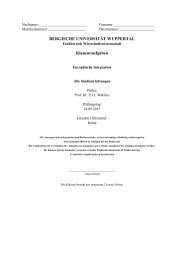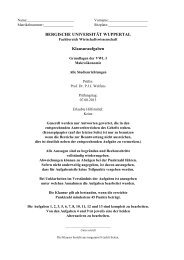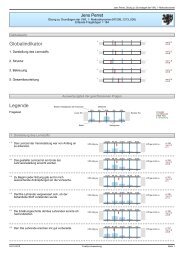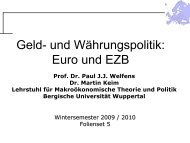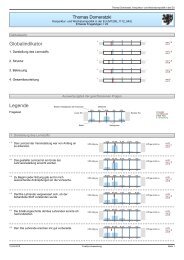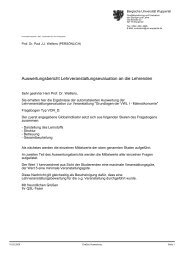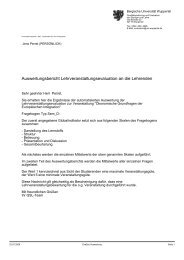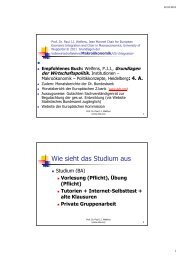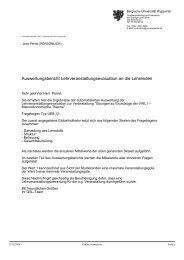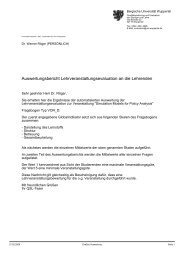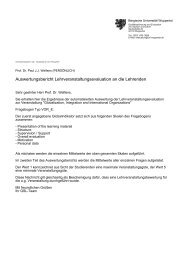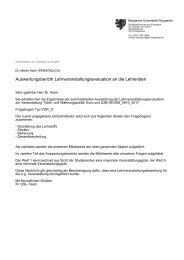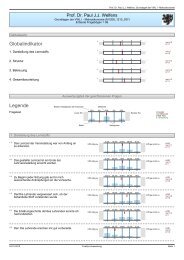UNIVERSITÄT POTSDAM - Prof. Dr. Paul JJ Welfens
UNIVERSITÄT POTSDAM - Prof. Dr. Paul JJ Welfens
UNIVERSITÄT POTSDAM - Prof. Dr. Paul JJ Welfens
Create successful ePaper yourself
Turn your PDF publications into a flip-book with our unique Google optimized e-Paper software.
Summary<br />
We analyze the role of information & communication technology (ICT) with respect to<br />
productivity growth and output growth in OECD countries where liberalization of telecommunications<br />
has contributed to accelerating internet expansion in the late 1990s.<br />
Based on the literature there is clear evidence for the US that both the ICT-producing<br />
sector and the ICT-using sector have significantly contributed to an acceleration of<br />
productivity and growth in the 1990s. The EU – in particular Germany, France, Italy<br />
and Spain – are lagging behind the US which has established a firm global lead in<br />
hardware and software. The internet will accelerate economic globalization and raises<br />
the demand for skilled labor thereby creating pressure for relative wage adjustments in<br />
OECD countries on the one hand; on the other hand investment in human capital and<br />
retraining will have a higher social rate of return in the future while it is unclear that the<br />
European model of the market economy is up to the new challenges. We also look into<br />
some theoretical aspects of innovation, internet/telecommunications and growth. Empirical<br />
evidence for Germany is presented that the use of telecommunications and the<br />
internet positively contribute to output growth and employment growth. Moreover, we<br />
report recent results from our gravity modeling of OECD trade showing that international<br />
telecommunications contributes positively to higher trade volumes. Economic<br />
policymakers in the EU face problems in optimally exploiting the growth opportunities<br />
of ICT; in the whole OECD the well-known imperfections of information markets generally<br />
compound progress towards a dynamic knowledge society.<br />
Zusammenfassung<br />
Dieser Beitrag untersucht die Rolle der Informations- und Kommunikationstechnologie<br />
(IuK) für das Produktivitätswachstum in OECD-Ländern, wo die Liberalisierung der<br />
Telekommunikation zu einer zunehmenden Internet-Expansion in den späten neunziger<br />
Jahren geführt hat. Anhand der Literatur lässt sich eindeutig erkennen, dass sowohl die<br />
IuK-produzierenden als auch -nutzenden Sektoren in den USA erheblich zum Produktivitäts-<br />
und Wirtschaftswachstum der neunziger Jahre beigetragen haben. Die EU -<br />
und hier insbesondere Deutschland, Frankreich, Italien und Spanien - hinken dieser<br />
Entwicklung hinterher. Das Internet wird die wirtschaftliche Globalisierung beschleunigen<br />
und mithin den Bedarf an qualifizierter Arbeit erhöhen. Dies hat zur Folge, dass<br />
in OECD-Ländern der Lohnanpassungsdruck sowie der zukünftige soziale Ertrag von<br />
Investitionen in Humankapital und Umschulungsmaßnahmen steigt. Zum jetzigen Zeitpunkt<br />
ist es unklar, ob das europäische Marktwirtschaftsmodell diesen Anforderungen<br />
gewachsen ist. Des weiteren werden einige theoretische Aspekte zum Zusammenhang<br />
zwischen Innovationen, Internet und Telekommunikation und Wachstum betrachtet.<br />
Für Deutschland werden empirische Belege angeführt, die auf die positiven Auswirkungen<br />
des Einsatzes von Internet- und Telekommunikation auf Wachstum und Beschäftigung<br />
hindeuten. Ferner werden aktuelle Ergebnisse unseres Gravitationsmodells



